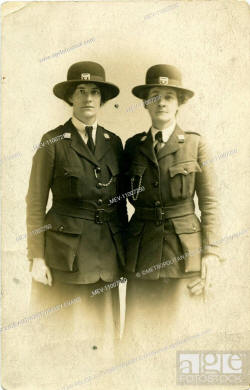

Queer Places:
The Courthouse Hotel, 19 - 21 Great Marlborough St, West End, London W1F 7HL, UK
 Edith
Mary Watson (née Wall; 6 November 1888 – 25 March 1966) was a British
suffragist, police officer and campaigner against Female Genital Mutilation in
the 1930s. Historical information about
Nina Boyle remains
scarce even though she was an advocate and political activist for women’s
rights for most of her adult life. Despite her prolific output as a writer and
her widespread reputation as energetic, witty and humorous, neither personal
letters nor diaries remain to give us facts about her private friendships.
Obituaries and tributes to her loyalty remain our key sources of insight into
her life as a lesbian and her own culture of female friendship. Feminist
historian, Katharine Fuller, in an unpublished manuscript supplies some of the
missing details. She refers to conversations with Edith Watson that give
insight into Nina Boyle’s lesbian existence. Nina Boyle and Edith Watson
jointly campaigned and wrote articles against sexual assault that were
published in women’s journals. Their friendship lasted a lifetime. Cicely Hamilton and
Edith Watson were
Nina Boyle’s close friends.
Edith
Mary Watson (née Wall; 6 November 1888 – 25 March 1966) was a British
suffragist, police officer and campaigner against Female Genital Mutilation in
the 1930s. Historical information about
Nina Boyle remains
scarce even though she was an advocate and political activist for women’s
rights for most of her adult life. Despite her prolific output as a writer and
her widespread reputation as energetic, witty and humorous, neither personal
letters nor diaries remain to give us facts about her private friendships.
Obituaries and tributes to her loyalty remain our key sources of insight into
her life as a lesbian and her own culture of female friendship. Feminist
historian, Katharine Fuller, in an unpublished manuscript supplies some of the
missing details. She refers to conversations with Edith Watson that give
insight into Nina Boyle’s lesbian existence. Nina Boyle and Edith Watson
jointly campaigned and wrote articles against sexual assault that were
published in women’s journals. Their friendship lasted a lifetime. Cicely Hamilton and
Edith Watson were
Nina Boyle’s close friends.
Watson was born in a workhouse in the London Borough of Hackney. Her mother was Martha Wall and she was an unmarried servant. At age fourteen she was employed as a nurse in South Africa. She formed her political ambitions when she was nearly raped by a fellow member of the Salvation Army. She left South Africa and the Salvation Army in 1909 and her allegiance moved to socialism. She married a Post Office worker named M. Wall in 1912.[1]
Watson had joined the Women's Freedom League in 1911. She continued the league's non-violent methods by writing for the left-wing Daily Herald under the title of Sketches in Green, Gold and White.[1] She and Nina Boyle wrote for "The Vote", where they argued against the injustices of a male-dominated legal system. Women victims needed to be cared for by women police and courts should realise that they could not expect women to give evidence in a court that was a room full of men.[2] Watson decided to document what she saw as unfair practise. She was employed as the Court correspondent for "The Vote" and she recorded the crimes or rape, sexual assault and incest ironically under the title of "The Protected Sex". She catalogued the sentences given to the perpetrators noting that prostitutes could get nine months for approaching clients whereas a man guilty of grievously harming a woman might get a third of the sentence.[3] She started this in 1912 and continued for three years to compare the sentences with those handed down for loss or damage to property.[1] Boyle and Watson went to Marlborough Street Police Court in 1914 and made a more militant protest. Watson was amongst other who were arrested for chaining themselves to the gates.[3]
She was a campaigner against Female Genital Mutilation in the 1930s. She wanted to have the practice banned inside the British Empire.[1]
Watson died in Worthing in 1966.
The archives of Edith Mary Watson can be found at the Library of the London School of Economics (ref 7EMW).
My published books:/p>